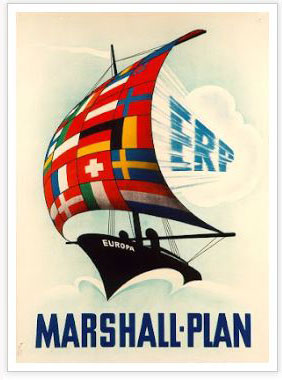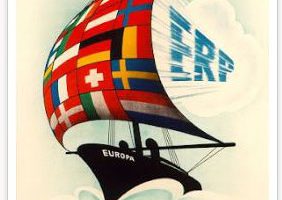The 70th Anniversary of the Marshall Plan fell early last month (5th June 2017). The event marks the speech of the Secretary of State George Marshall during Harvard graduation ceremony the 5th June 1947. This speech and the European Recovery Program born after it, made history for its multiple meanings and consequences. Transatlantic relationship had been already boosted by the joined exertion of winning the WW II, however with Marshall Plan the closeness and tightness of the links connecting the two sides of the Atlantic reached a never seen level and spread to all western Europe. Indeed, the new connections weren’t only economic or political but they dealt also with culture, ideology and values. From the American Dream to consumerism, from a full acceptance of Free market doctrine to the commitment toward democratic values and institutions, from the empowerment of public opinion ad masses to the need of a strengthened cooperation between European countries.

Marshall Plan steered the transformation process occurred in Europe after the World war II, it made Europe evolving in what is now. Concretely, the Plan meant 13 billion of dollars (the equivalent of 130 billion today) of economic aids, 16 western European countries involved, 4 years duration and a +10% rise of the gross national product of the countries involved. During those four years Marshall Plan focused on the reconstruction of industrial and agricultural capabilities of western countries throughout firstly shipment of food, machinery and fuel and later investments and loans. As Marshall himself stated in his speech, the Plan wasn’t thought to be a mere palliative but a cure capable to restore economic stability in all Europe, as the aids were directed to every country willing to accept, Soviet Union included. The success was stunning: during the years 1948-1951 Europe lived its fasted period of growth in all history, industrial production increased on the 35% while agricultural production widely surpassed the pre-war level. Even if a general recovery was already undergoing, Marshall Plan helped to fasten the process, mostly thanks to the forced structural adjustments implemented inside the archaically managed European economies.
However, Marshall Plan wasn’t only one of the most successful aid programs of the modern history but also precise ideological and strategic statement on the future United States relations with the world. Indeed, the speech contains three fundamental aspects that shaped US role after the World War II.
First, it signed the expressed American commitment in protecting (liberal) world and in assuring peace, development and stability. With the decision to substitute UK in providing military and economic assistance to Greece and Turkey against any internal or external threat to democracy (in case of Greece for avoiding the victory of the Communist Party inside the civil war) US started to act as “world policeman”. That meant not only protect the closest American interests but also to expand them until worldwide political and economic stability became an American priority. From that moment, US fully undertake its new role of global superpower by spreading its influence over all the lands it could reach, a.k.a. the land not influenced by the Soviet Union. A grateful Europe represented the start of the new hegemonic position as it meant the establishment of tighter economic cooperation and therefore political control over the newbie democracy born after the war as well the old ones.
Second, by affirming United States duty to help Europe and whoever is willing to accept its aids, Marshall Plan concurred to outline the upcoming Cold War. Even if Stalin thought to accept the aids, the economic cooperation linked to them wasn’t sustainable for a communist economy and it would have undermined the tight control of the Soviet Union on its buffer zone of East Europe. The URSS imposed prohibition to accept the aids divide what after has been called the Eastern Bloc from the Western one, raising the famous “iron curtain”, damaging irreversibly US-URSS relations.
Third, the Plan was based on a clear liberalistic ideology that will be conveyed inside European system of values. With Marshall’s words, American policy was not direct to any antagonist country or doctrine “but against hunger, poverty, desperation, and chaos”. Only if United States helped European people to restore a normal and secure life, then political disorder, masses anger, internal and external conflicts would be avoided. Economic stability is a prerogative of political one. Moreover, the only way to fend off Europe from another catastrophic conflict was to encourage a breakthrough inside European countries cooperation by cementing unbreakable economic ties.
One of the prerogatives already outlined inside the speech was the need of European countries to work together as “put Europe on his feet” was a European business only. The management of the funds and shipments provided by the States, the setting of a joint recovery plan as well as the distribution of these resources required the establishment of the Organization for the European Economic Co-operation (OEEC), where the 16 countries involved in the plan started to work together. The organization’s priorities weren’t only how to better use American dollars but also to develop an intra Europe trade system by reducing tariffs and barriers, to study a possible customs union or free trade area and to improve conditions of labour utilisation. Basically, the OEEC had started the discussions finished in the European Economic Community, sometimes even carried by the same men as in the case of Paul-Henri Spaak, who worked inside both organizations.
Hence, Marshall Plan did not help European countries to restore only their economies but also to restore trust between them, a necessary step for starting a long-lasting cooperation. The same liberalist logic was behind the 1950 Shuman Declaration: creating a deep economic bound between France and Germany was the only way to stop resentment and mistrust to grow in the same way as after the WW I. The establishment of a supranational organization capable to control and keep tracked coal and steel production and trade would have ensured a neutral third side able to supervise army production as well as to anchor durable trust liaisons among the two countries. Seventy years later, the evolution of what the embryonic European Coal and Steel Community (ECSC) had started is linking almost all western and eastern European countries into a supranational organization that shares some common characteristics with a federal state.
European Union was built on the same values and logic spread by the Marshall Plan. This connection symbolizes the meaningfulness of transatlantic relationship for both US and Europe history as it created a win-win situation which empowered both side of the Atlantic. However, the legacy of Marshall Plan is still an incredibly valuable lesson today: the end of Isolationism, the expansion of the market and trade routes with Europe, the acceptance of the new hegemonic role led America to reach its golden ages while at the other side of the ocean European countries started to understand the outstanding benefit of a tighter cooperation based on shared values.
Nowadays, the attempt to reach other win-win situations or to maintain that liberal order on which western world is based on is no more supported by the same strong political willingness as it was after the World War II. Europe faced and is still facing several crises that undermined the govern effectiveness and reputation of its common institutions. Starting from Greek crisis arriving to Brexit and populist victory, Europe seemed to be overwhelmed by the event while inside the Union’s Member States lacked political cohesion required to build a strong and unanimous answer. While Europe is struggling with centrifuge forces, the United States are seeing the revival of its old bete noire, isolationism, impersonated by the new President Donald Trump.
America is pulling back from its worldwide responsibilities, from climate change to the respect of human rights, and renouncing to the global leadership gained and perpetrated since the end of the World War II. Nowadays situation is therefore remoulding transatlantic relations: America wants to be less involved into European matters and security issues, while Europe, already pressured by critical internal issues, is incapable to cope in a constructive and unanimous way with external threats and difficulties.
Transatlantic relations are therefore put at stake. The current situation could damage not only trades, investment and commerce routes crossing the Atlantic but also the trust between the two sides. If Europe and US are no more supporting and sharing the same values system, the liberal international order is no more bearable, leaving a gap that benefits other growing powers such as Russia and China with even more uncertain outcomes. As President, Donald Trump won the elections on the basis of its “America first” slogan, determinant changes inside his policies are highly improbable, as would be a sure political suicide. Instead, European countries are having a great chance to find a new position inside the new changed international order. As German Chancellor Angel Merkel stated in occasion of the 70th Marshall Plan Anniversary ceremony, Europe must realize that it must take its fate in its own hands, breaking the dependency link with America and face in first person the new world challenges.
Visits: 251

